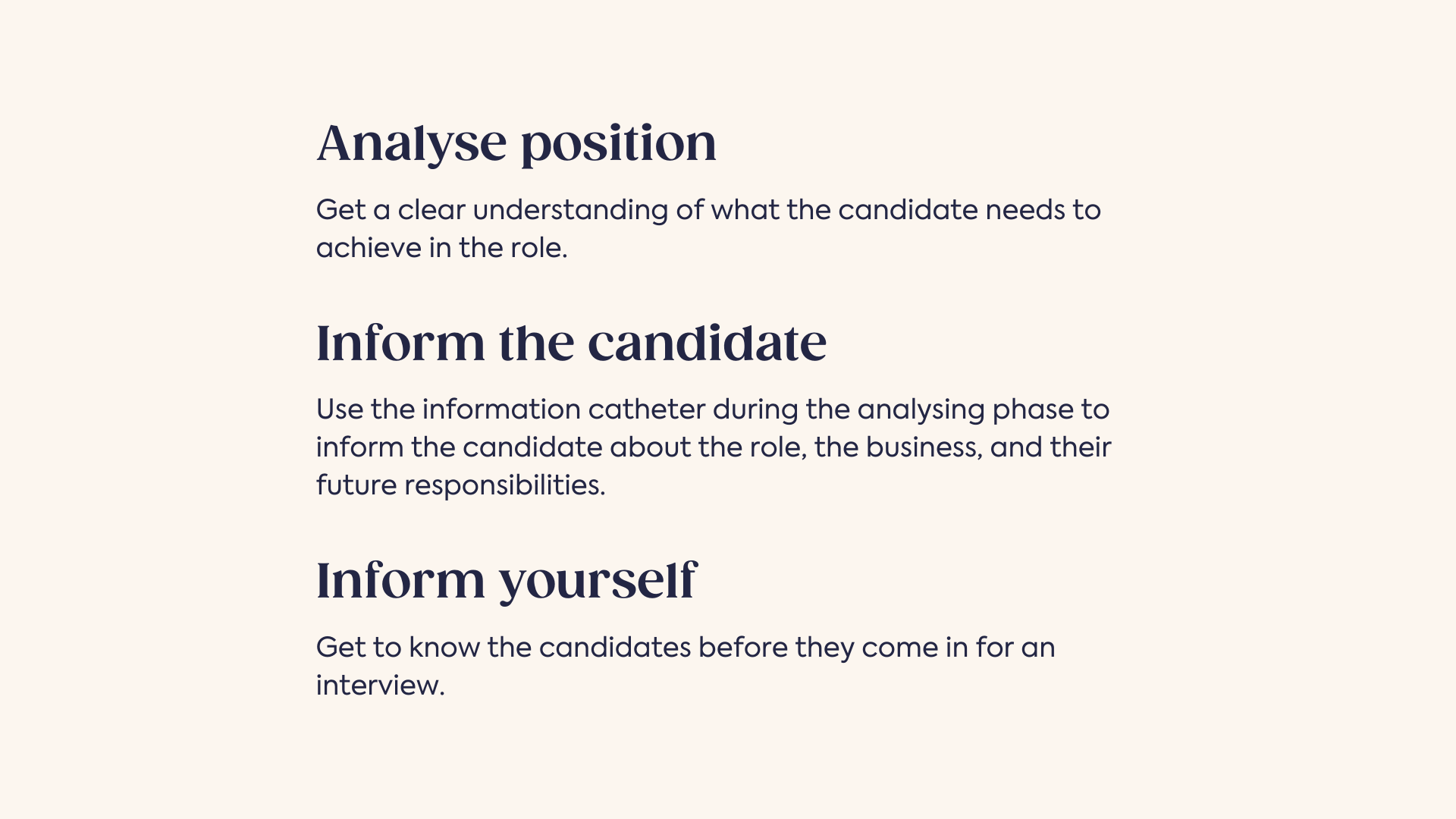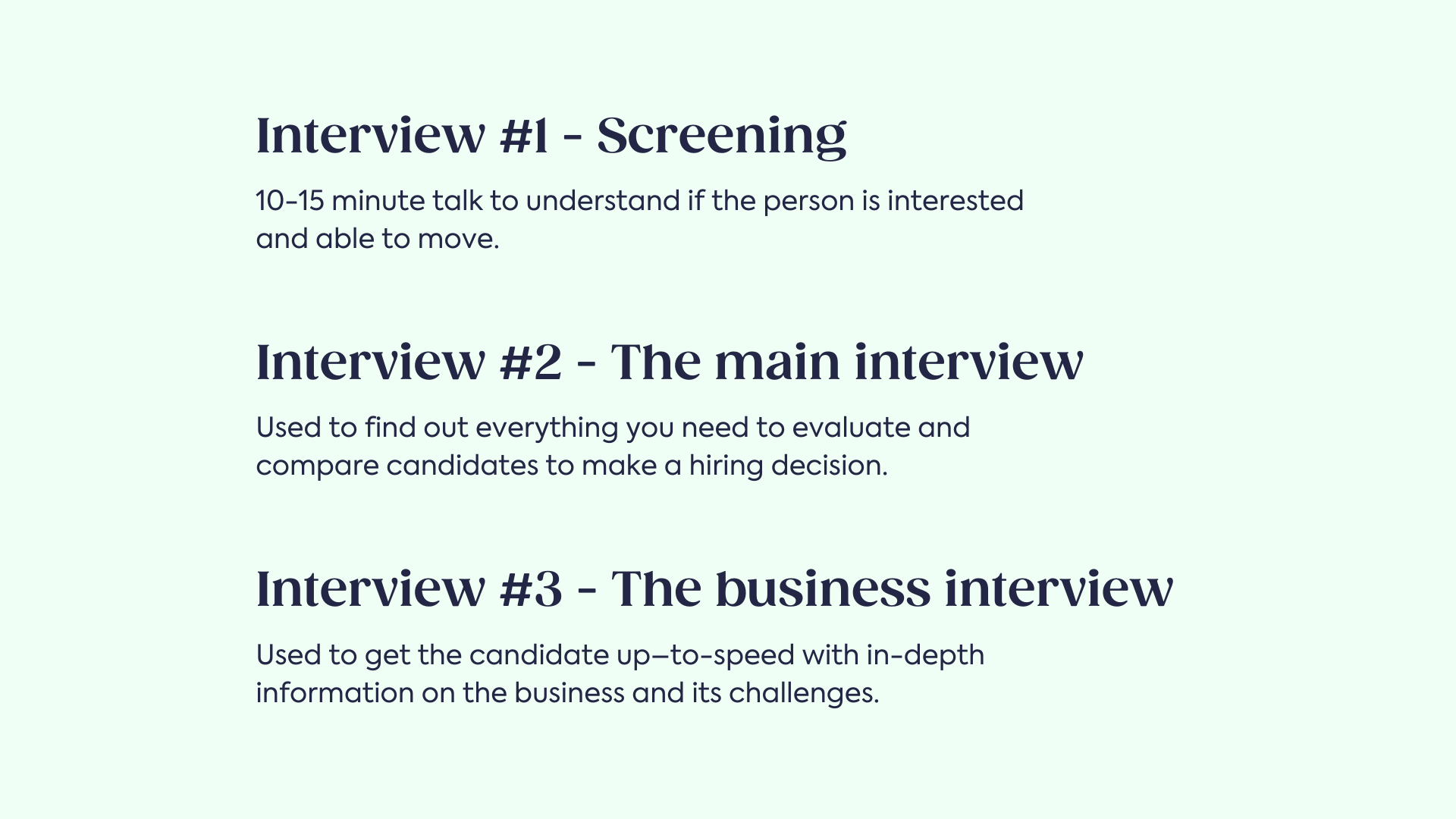How to prepare for an interview
The goal of any interview process is to hire the best candidate, but without proper preparation, it's easy to miss crucial insights.
Preparing to Interview candidates is not rocket science. It’s a process with three simple rules:
Analyse the position
Inform the candidate
Inform yourself

Analyse position
Get a clear understanding of what the candidate needs to achieve in the role. What are the requirements to do this? And finally, what are the competencies required to do the job in the best possible way?
Learn more: Position analysis example
Inform the candidate
Use the information catheter during the analysing phase to inform the candidate about the role, the business, and their future responsibilities. Share everything you know about the role and the company.
Inform yourself
Get to know the candidates before they come in for an interview. At the very minimum, work through their CV to understand their previous experience and how that compares to the job analysis. Note down any points that need clarifying and ask about those during the interview.
For example, a candidate might write in their CV that they are professional in project management. And you have previous experience as a project manager as one of the position requirements.
The problem is that project management can mean a million different things. During the interview, dig into how big the projects were, how many people were involved, how many projects, etc.
What's the purpose of position analysis?
- To select the best job ad title.
- To get a clear understanding of the role and what a successful candidate needs to achieve in the role.
- To get to know candidates before they come for an interview.
Is five interviews enough?

It’s not uncommon for two, three or even four people to be involved with hiring. That doesn’t necessarily mean that they all need to have interviews with the candidates.
Getting input from multiple people is necessary in many cases, but having individual interviews with everyone is not. You can get the input you need by inviting extra evaluators to the interview(s).
In any case, the ultimate decision lies with one person - the hiring manager. More people can be involved, but the decision comes down to one.
Good practice dictates that you need three interviews to make a hiring decision:
Interview #1 - Screening
10-15 minute talk to understand if the person is interested and able to move.Interview #2 - The main interview
Used to find out everything you need to evaluate and compare candidates to make a hiring decision.Interview #3 - The business interview
Used to get the candidate up–to-speed with in-depth information on the business and its challenges.
What's the optimal number of interviews?
- 1
- As many as needed.
- 3
The main interview
The main interview is the core of the hiring process. It’s the place to ask the questions you need for evaluating candidates. It is not a place to wing it and come up with random questions; use previously prepared questions only.
Start by explaining the purpose and plan for the interview. Follow that up by asking if the candidate has questions about the role or the business (no need for a company presentation).
Next, the critical part of the interview - the questions you need for evaluation purposes. Concentrate on getting answers that will help you evaluate the candidate based on the requirements and criteria. There’s no need for questions about their hobbies, interests, family, etc. Finish that up by asking if the candidate has additional questions.
And finally, end the interview with practical things. What and when happens next, when they should expect to hear from you, the next steps in the process, when they could start if offered the position, etc.
What's the purpose of the main hiring interview?
- To understand if someone is interested to work at the company.
- To get candidates up-to-speed with the business and its challenges.
- To evaluate a candidate's suitability according to the hiring criteria.
Questions to ask
Avoid questions that ask the candidates their thoughts on X or Y. What is your approach to problem-solving? What is your opinion about performance management, etc. In this context, opinions are irrelevant. What matters is their experience.
On problem-solving, a better question could be: Describe a situation where you had to solve a complex problem. Describe a situation - it implies lived experience and their approach to solving it. Not an opinion on how a problem could be solved.
Or another - Can you remember a situation where you had to handle an underperforming subordinate? Please describe your action and the outcome.
If you could ask only questions for the candidate, ask what would be their main challenge in this role and how their previous experience supports being successful at it.
And then, dig into this for 10-15 minutes to understand in detail what the candidate has done previously and how that could be applied in this new role.
Learn more: A guide to behavioural interviewing
Conclusions
Preparing for a candidate interview starts before you even have candidates. It starts by properly understanding the position, and what a successful candidate is expected to achieve.
Get this right, and you're well on your way to better interviews. Better both for the candidate and yourself. Interviewing gets easier the better you understand the position that you're hiring into.
Apart from that, remember the rule of three. it takes three interviews to hire someone. First, to understand if your target is ready and willing to move. Second, to evaluate them against a pre-determined list of criteria and requirements. And third, a business interview to get a candidate up-to-speed on business and it's challanges.